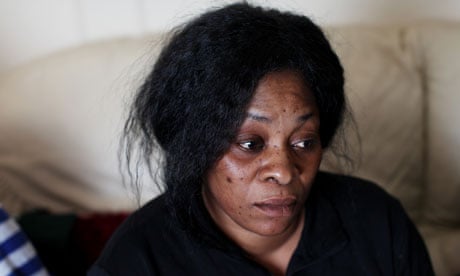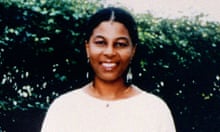Jimmy Mubenga spoke to his wife of more than 15 years for the last time from his seat between two private security guards at the back of BA flight 77 at Heathrow airport on Tuesday evening.
The 46-year-old Angolan, who had been fighting an increasingly desperate battle to stay in the UK for the last four years, had been allowed to make one last call as he waited for the plane bound for Luanda, in Angola, to take off.
"He was so sad, he was saying: 'I don't know what I am going to do, I don't know what I am going to do,'" his wife, Makenda Kambana, told the Guardian today. "Then he said: 'OK, just hang up and I will call you back'... but he never did call back."
Mubenga, who was pronounced dead less than an hour later, had been in the UK for 16 years.
"I feel so sad ... I don't know, I was thinking if I was there to help him. The children just can't stop crying and I don't know what to say to them," said his widow.
The couple had fled Angola in 1994. Today Mubenga's lawyer, Hani Zubeidi, said he had been a student leader who had fallen out with the regime.
Kambana said: "They killed my father and they threatened to kill Jimmy. They were looking for him. We had no choice but to leave."
She and her young son arrived in the UK in March 1994 and Mubenga joined them three months later. After a protracted legal battle he was granted exceptional leave to remain. Over the following 16 years the couple moved across London and had another four children. Mubenga worked as a forklift truck driver and was a devoted family man, his widow said, and the couple eventually settled in Ilford in Essex with their children, who are now aged 16 to seven months.
"We are happy as a family," said Kambana. "Jimmy was a good man, a family man. He would do anything for the children. He would take them to school and pick them up, if I ever went to school they would all ask: 'Where is Jimmy?' Everyone knew him and he was a kind man. People liked him."
In 2006 Mubenga was convicted of actual bodily harm and sentenced to two years following a brawl in a nightclub. After serving his sentence he was transferred to an immigration detention centre and his lawyer said he has been in and out of detention ever since as the family fought to stop him being deported. It is believed that his criminal conviction was a factor in his deportation.
"He was desperately worried about leaving his wife and family," said Zubeidi yesterday. "He was a devoted family man and was extremely anxious about the impact his deportation would have on them all."
Kambana said her husband had spent seven months at home earlier this year but on 23 August his final application for a judicial review was refused at the high court. A few weeks later he was picked up by immigration officials.
"He had to go and report every Monday and he was leaving that day. He said to me don't come with the baby because the weather is not good. Later he phoned and said 'they told me to stay here' and that was it," she said.
She said her husband was given his deportation date later the same day. "He was crying and saying: 'How can I be free, when will I be free? He was so sad. He did not want to leave the children."
He was also worried about his safety in Angola. "They are still looking for him there," said Kambana. "They want to kill him and he was worried that if he went he would never see his children again."
Mubenga was then moved to the Brook House removal centre where he was kept until he was transferred to Heathrow on Tuesday. Kambana said she had spoken to him at about 3pm on the day he died and he had seemed reasonably calm.
"He was friendly with them [the guards]. They did not put him in handcuffs because he was good to them. I heard them asking him how are the children?"
However, when she last spoke to him on the plane she said he had seemed very sad. "He was so sad. He was saying: 'I don't know what I am going to do, I don't know what I am going to do.' "
Witnesses have told the Guardian that Mubenga had been forcibly restrained by three security guards and had been shouting out that he could not breathe. One passenger said he heard him shout: "They are going to kill me."
"You could hear the guy screaming at the back of the plane. He was saying 'they are going to kill me.' That's what he repeatedly said. He was saying that right from when I got on the plane. He just kept repeating that all the way through."
Mubenga was pronounced dead later that evening at Hillingdon hospital. Yesterday Kambana said his death had left the family numb with shock.
"I feel so sad. I don't know, I was thinking – if I was there to help him. The children just can't stop crying and I don't know what to say to them."







